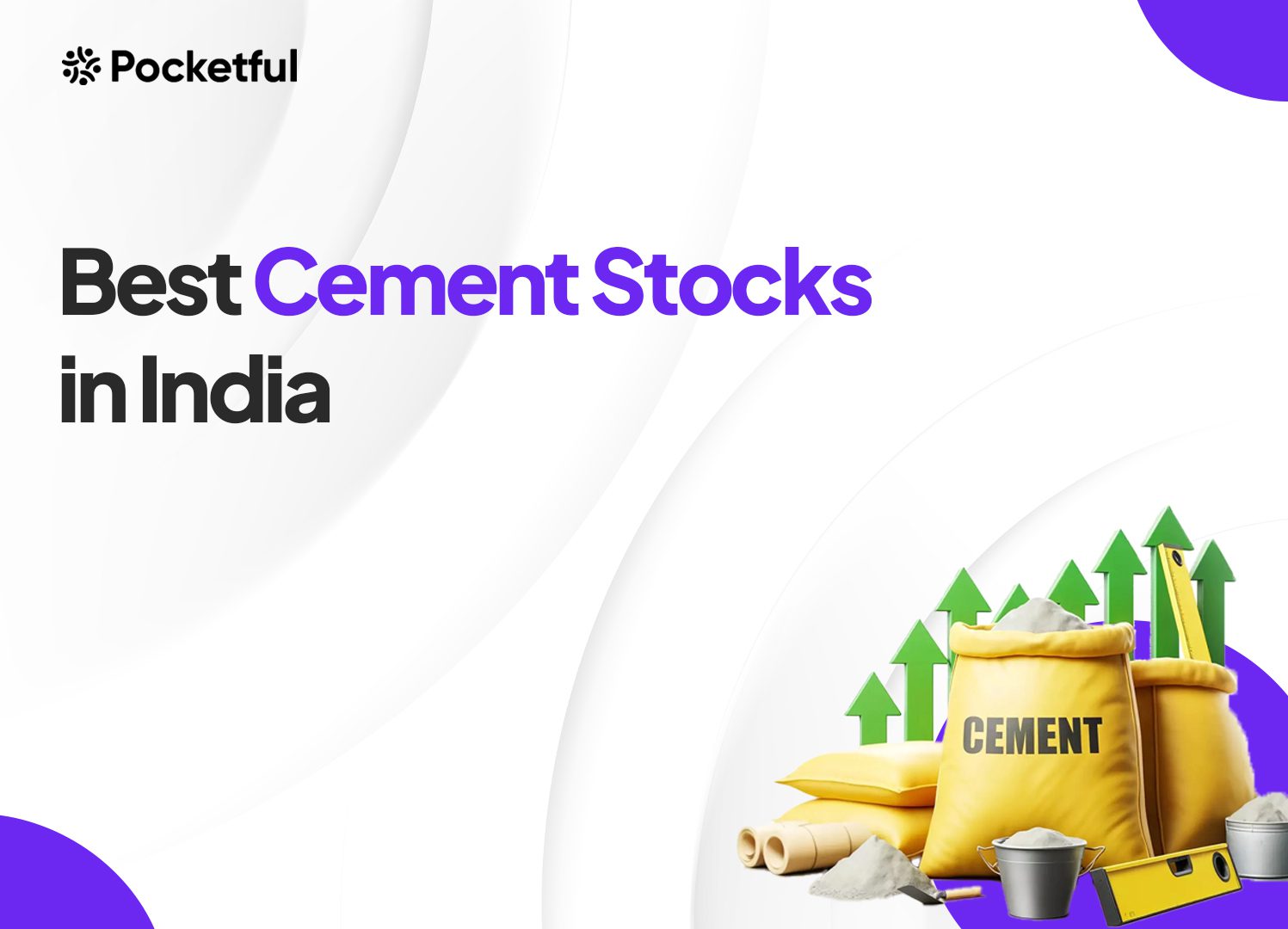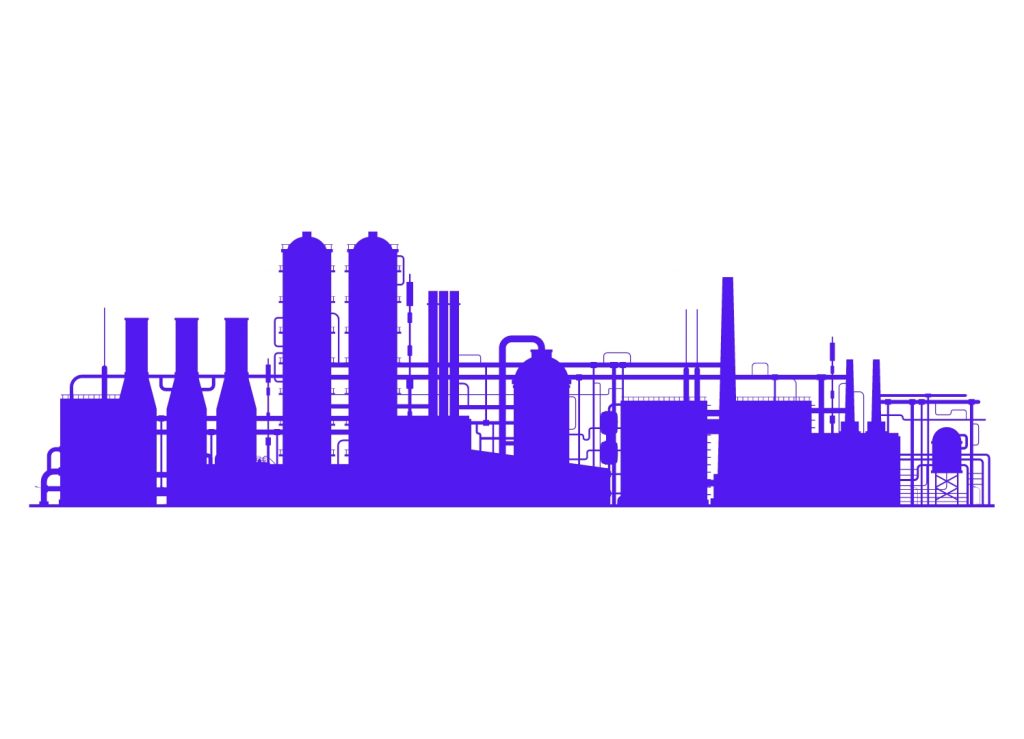| Type | Description | Contributor | Date |
|---|---|---|---|
| Post created | Pocketful Team | Aug-29-24 |

- Blog
- best cement stocks in india
List of Best Cement Stocks in India 2025

The cement industry has always been a crucial sector in the global economy, producing a key material for building infrastructure. It is one of the largest sectors in India, contributing significantly to the economy. As of 2024, India is the second-largest cement producer, with an annual production capacity of over 550 million tonnes.
In today’s blog, we will discuss the best Cement stocks in India based on market capitalization and 1-year returns.
Overview of the Cement Industry In India

The cement industry in India is also a major employer as it provides jobs to over a million people directly and indirectly. Domestic demand is the main factor driving the sector’s growth. The cement exports to neighboring countries make India a key player in the global cement market. The Indian cement industry is poised for significant growth as new investments and capacity expansions are planned to meet future demand. The sector is expected to grow at a CAGR of 6-7%, driven by urbanization, infrastructure projects, and government initiatives like affordable housing.
Top Cement Stocks Based on Market Capitalization
The Top Cement Stocks in 2025 are:
| S.No. | Cement Stocks |
|---|---|
| 1 | UltraTech Cement Ltd. |
| 2 | Ambuja Cements Ltd. |
| 3 | Shree Cements Ltd. |
| 4 | ACC Ltd. |
| 5 | Dalmia Bharat Ltd. |
The cement stocks have been listed in descending order based on their market capitalization in the table below:
| Company | Market Capitalization (in INR crore) | Current Market Price (in INR) | 52-Week High (in INR) | 52-Week Low (in INR) |
|---|---|---|---|---|
| UltraTech Cement Ltd. | 3,22,062 | 11,156 | 12,078 | 8,045 |
| Ambuja Cements Ltd. | 1,49,364 | 606 | 707 | 404 |
| Shree Cement Ltd. | 88,759 | 24,600 | 30,738 | 23,700 |
| ACC Ltd. | 43,285 | 2,305 | 2,844 | 1,803 |
| Dalmia Bharat Ltd. | 34,416 | 1,835 | 2,431 | 1,651 |
Read Also: Ultratech Cement Case Study – Financials Statements, & Swot Analysis
Best Cement Stocks in India Based on Market Capitalization – An Overview
The best cement stocks in India are given below, along with a brief overview:
1. UltraTech Cement Ltd.
UltraTech Cement Limited, based in Mumbai, is an Indian multinational cement company. It is now India’s largest manufacturer of grey cement, ready-mix concrete (RMC), and white cement. Globally, it ranks as the fifth-largest, with its installed capacity of 152.70 million tonnes per annum and a sales volume of 119 million tonnes per annum. UltraTech Cement is a key player in the construction industry because of its extensive product range and significant market presence.
2. Ambuja Cements Ltd.
Ambuja Cements Limited is one of India’s leading cement companies and a part of the Adani Group. The company is known for its sustainable development projects and environment-friendly practices and has been providing reliable home-building solutions. The company’s innovative products meet customer needs and help reduce carbon footprints. Ambuja Cements actively contributes to societal well-being, which makes it one of the most trusted brands in the Indian cement industry.
3. Shree Cement Ltd.
Shree Cement Ltd was founded in 1979 in Beawar, Rajasthan and is India’s third-largest cement producer. It has an installed capacity of 46.9 million tonnes in India and 50.9 million tonnes, including overseas. The company has expanded significantly since 2006 by increasing plant capacities and entering new regions. In 2024, the company announced ‘Bangur’ as its master brand. The company’s headquarters is in Kolkata.
4. ACC Ltd.
ACC Limited, formerly known as The Associated Cement Companies Limited, is an Indian cement producer headquartered in Mumbai. It is a subsidiary of Ambuja Cements and part of the Adani Group. The company was established when eleven cement companies merged to form the “The Associated Cement Companies” on 1 August 1936. It has 18 cement manufacturing units and 82+ ready-mix concrete plants across the nation. On 1 September 2006, it officially changed its name to ACC Limited. The company‘s headquarters is in Mumbai.
5. Dalmia Bharat Ltd.
Dalmia Bharat Limited is an Indian cement manufacturing company primarily engaged in producing and selling cement and related products. The company was established in 1939 and has an installed capacity of 46.6 million tonnes. The company offers a wide range of cements, including Ordinary Portland Cement (OPC), Portland Slag Cement (PSC), Portland Pozzolana Cement (PPC), and Portland Composite Cement (PCC). It also produces speciality cement like sulfate-resisting Portland cement, railway sleeper cement, oil well cement, and cement for airstrips and nuclear power plants. The company’s headquarters is in New Delhi.
Top Cement Stocks Based on 1-Year Return
The cement stocks have been listed in descending order based on their 1-year returns in the table below:
| Sr. No. | Company | 1-Year Return |
|---|---|---|
| 1 | Mangalam Cement Ltd. | 194.91% |
| 2 | Kesoram Industries Ltd. | 142.44% |
| 3 | Hemadri Cements Ltd. | 126.40% |
| 4 | KCP Ltd. | 101.07% |
Best Cement Stocks in India Based on 1-Year Return – An Overview
The best cement stocks according to 1-Year return are given below, along with a brief overview:
1. Mangalam Cement Ltd.
Mangalam Cement Limited, part of the B.K. Birla Group started commercial operations in 1981. The company manufactures cement in plants based in Rajasthan and Uttar Pradesh and sells its products under the Birla Uttam brand name. The company has a production capacity of 44 lakh MTPA and primarily serves markets in Uttar Pradesh and Rajasthan. It has a strong distribution network and focuses on sustainability, aiming to increase the production of fly ash-blended cement. The company’s headquarters is in Kolkata.
2. Kesoram Industries Ltd.
Kesoram Industries Limited, a B.K. Birla Group company was established in 1919. The company manufactures cement, tyres and rayon. The company produces cement under the “Birla Shakti” cement brand, with plants in Karnataka and Andhra Pradesh and a packing unit in Maharashtra. It recently refinanced its debt to reduce interest costs. The company has a total installed capacity of 10.75 million tons per annum. The company’s headquarters is in Bangalore.
3. Hemadri Cements Ltd.
Hemadri Cements Ltd was established in 1981. It manufactures and sells cement with a focus on quality and durability. Its products include Hemadri 43 Grade and Hemadri Gold 53 Grade. Cement is manufactured exclusively from Vedadri Lime Stone, which results in high compressive strength and consistency. The company’s headquarters is in Chennai.
4. KCP LTD.
KCP Ltd operates in multiple sectors, including cement, sugar, heavy engineering, power generation, and hospitality. The company runs two cement plants in Andhra Pradesh with a combined capacity of 4.3 MTPA and a packaging plant in Tamil Nadu.
The company has been associated with ISRO for three decades, supplying crucial components for rocket vehicles. KCP plans to expand its facilities to support ISRO’s future programs, including the development of larger rocket motor cases and precision machine shops. The company’s headquarters is in Chennai.
Read Also: List of Best Education Stocks in India 2025
Key Performance Indicators
| Company | ROE (in %) | ROCE (in %) | Debt/Equity | P/E Ratio | P/B Ratio |
|---|---|---|---|---|---|
| UltraTech Cement Ltd. | 11.63 | 14.12 | 0.17 | 45.90 | 5.35 |
| Ambuja Cements Ltd. | 8.62 | 11.17 | 0 | 44.86 | 3.59 |
| Shree Cement Ltd. | 11.57 | 14.74 | 0.07 | 42.23 | 4.29 |
| ACC Ltd. | 14.30 | 15.45 | 0 | 19.37 | 2.65 |
| Dalmia Bharat Ltd. | 5.03 | 6.25 | 0.28 | 41.18 | 2.11 |
| Mangalam Cement Ltd. | 7.35 | 13.39 | 0.74 | 44.78 | 3.43 |
| Kesoram Industries Ltd. | -405.07 | 11.38 | 23.48 | -15.46 | 67.52 |
| Hemadri Cements Ltd. | -47.47 | -45.11 | 0.49 | -3.55 | 2.59 |
| KCP Ltd. | 13.37 | 16.13 | 0.34 | 15.30 | 2.07 |
Benefits of Investing in the Cement Stocks in India

Investing in cement stocks can have several advantages, some of which are listed below:
- Consistent demand from urbanization and infrastructure projects results in consistent revenues and profits.
- Government-supportive policies and incentives will boost sector profitability.
- Increased infrastructure needs in the future will create new avenues for growth.
Factors to Consider Before Investing in Cement Stocks
There are various factors one should take into account before investing in cement stocks:
- Assess current and future demand for cement in the market.
- Review the financial health and past performance of the company.
- Evaluate the level of competition and market share.
- Monitor economic conditions and their potential impact on the sector.
Read Also: List of Best Monopoly Stocks in India (2025)
Future of Cement Stocks in India
The future of cement stocks in India looks promising. The government’s focus on infrastructure projects, urbanization, and affordable housing is creating demand for cement. Companies are expanding their capacities and adopting sustainable practices, which bodes well for long-term growth. As India continues to develop, the cement industry will benefit from increased construction activities. You can anticipate steady returns from this sector due to consistent demand and ongoing development initiatives. However, it is advised to consult a financial advisor before investing.
Frequently Asked Questions (FAQs)
What are the key factors driving the growth of cement companies in India?
Some of the key factors driving the growth of cement companies are increased government infrastructure spending, urbanization, housing demand, and real estate revival.
How do raw material costs impact cement companies in India?
Fluctuations in raw material costs affect production expenses and profitability.
What role does technological innovation play in the cement industry?
It improves efficiency, reduces costs, and minimizes environmental impact.
Are there any risks associated with investing in cement companies in India?
Cement companies face risks related to regulatory changes, raw material price fluctuations, economic downturns, and competition.
How do export opportunities impact Indian cement companies?
Exports provide additional revenue and help mitigate domestic market fluctuations.
Disclaimer
The securities, funds, and strategies discussed in this blog are provided for informational purposes only. They do not represent endorsements or recommendations. Investors should conduct their own research and seek professional advice before making any investment decisions.